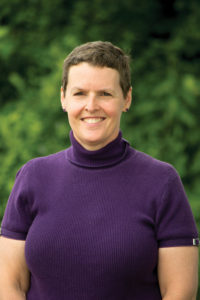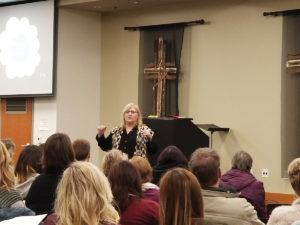Human trafficking
5/2/2018The coercion, the fear and the betrayal of this underreported crime
 Jocelyn was born and raised near Waterloo. By the time she was 24, she was ready for a fresh start.
Jocelyn was born and raised near Waterloo. By the time she was 24, she was ready for a fresh start.
She had good parents, graduated from high school and even attended a few college classes, but she had veered off
course. She’d made some questionable decisions that resulted in two teenage pregnancies and a third in her early 20s. Jocelyn wanted something new. She visited Minneapolis and was in awe of the big-city vibe. She met a charming man who doted over her, and they started to date.
He bought her jewelry, nice clothes and a car. He made sure her hair and nails were done. He gave her a place to live.
“He didn’t come right at me; he built me up and made me feel special,” Jocelyn remembers.
Bit by bit, Jocelyn began to see his true colors. He was verbally and then physically abusive. She came home one day and another man was waiting for her. Her man told her toperform sexual acts with the other man.
He told her: “I need you to get this man off.”
Jocelyn started to cry. She argued with her man. He slapped her. “If you don’t do this, you have to go,” he told her.
“I was living with him and didn’t want to be put out on the street,” Jocelyn says. “I got dependent on him and was
scared.”
That’s how Jocelyn’s life in human trafficking began.
Traffickers use various means of coercion to reign over victims
There is no typical victim or one stereotype for victims of human trafficking. Some are young children; others are in their 30s or40s. Victims come from rural communities and metropolitan areas. Some are able to escape right away, while others might be trafficked for decades.
Some things are typically the same: the coercion, the fear and the betrayal that traffickers use to prey on the vulnerabilities of their victims.
 “You manipulate that vulnerability so that person believes you, the trafficker, are the only person who can support them, love them and want them,” says Ruth Buckels, the manager of Teens Against Human Trafficking and Achieving Maximum Potential for Youth & Shelter Services, which provides programming and service in central Iowa.
“You manipulate that vulnerability so that person believes you, the trafficker, are the only person who can support them, love them and want them,” says Ruth Buckels, the manager of Teens Against Human Trafficking and Achieving Maximum Potential for Youth & Shelter Services, which provides programming and service in central Iowa.
When the person begins to see through the lies, the abuse starts. They’re blackmailed. They’re told no one will ever want them.
“It’s a cluster of lies and insecurities magnified,” Buckels says.
Human trafficking, by law, is defined as the exploitation of someone for the purposes of labor or a commercial sex act through use of force, fraud or coercion.
Traffickers are able to retain so much control over their victims because humans respond to the things they offer and threaten them with — love and affection, and then pain and fear, Buckels says.
Victims are told they’ll be tortured, knifed, cut, have chemicals poured on their body or used to wash their orifices. They’re manipulated and told their family isn’t looking for them or doesn’t love them. Buckels says it’s similar to the strategy used in slavery, which explains how one individual could control and watch over 50 or more slaves without them revolting.
“Keeping someone in this life is an excellent balance of betrayed love — ‘Only I love you, and only I can do this for you’ — and fear.” She says. “Even the most brilliant of people who have survived this will come back and say: ‘Oh my gosh! That’s what they did to me.’ ”
Advocates converge
State officials want to bring the issue of human trafficking to the forefront of the minds of law enforcement, the medical community, prosecutors, judges, social workers and victim service providers. That’s why they hosted the Human Trafficking Summit that took place last month in Altoona. Attendees received specialized training on a baseline to recognize human trafficking, as well as guidance for what actions to take.
“There is a large understanding that there is a lack of training across the state, and we want to be unified in the training that we provide,” says Celine Villongco, the human trafficking statewide coordinator for the Iowa Attorney General’s office, one of the sponsors of the event.

Terry Forliti, a survivor of human trafficking and the executive director of Breaking Free, speaks at an anti-human trafficking event in January at Plymouth Congregational Church in Des Moines. Breaking Free is a Minnesota-based organization that rescues and provides shelter to about 350 sex trafficking victims each year.
Iowa’s location at the crossroads of two major interstate highways makes it part of “the circuit” for traffickers who travel nationally or regionally. Iowa, particularly Des Moines, is a stop for those traveling to Denver, Kansas City, Chicago, Omaha, Lincoln, Minneapolis, St. Louis and other Midwest locations, says Terry Forliti, a human trafficking survivor and executive director of Breaking Free, a Minnesota-based organization that rescues and provides shelter to about 350 sex trafficking victims each year.
Forliti was in Des Moines in January to speak at a human trafficking event at Plymouth Congregational Church. While here, Forliti says she saw a woman being picked up for a call while her pimp watched, as well as other questionable situations that could have been cases of trafficking.
Buckels with YSS says she sees three types of trafficking on a daily basis in central Iowa:
• Family trafficking in which parents traffic their own children as a way to pay the bills and keep a roof over their heads.
• Gang trafficking in which gang members have gotten into trouble in other parts of the state and come to Des Moines to “cool down.” They’re sent with a couple of people to sell to pay for the gang member’s housing or to help pay for fuel as part of a drug transaction.
• Sex ring trafficking that is set up similarly to a business in which one person is in charge and others within the organization have jobs: traffickers, victims, victims who also traffic, and so on. The business may be diversified and also connected to the sale of drugs, weapons, organs, insurance, medical supplies and services, and more.
“It’s not always what you think: a drug addict or someone from the city or someone who doesn’t have anything,” Jocelyn says. “It can be an average female from anywhere. It doesn’t make you a bad person. It’s more about survival.”
Jocelyn herself was a high school graduate and attended some college classes. She came from a two parent family, and her parents were hard workers with good jobs.
“I had a good home,” she says. “I know I’ve disappointed my parents. I know it’s embarrassing for my family.”
Jocelyn’s pimp used her to help recruit other girls. They’d visit bus stations or wait outside the jail on Monday mornings for the addicts to leave from their weekend stay.
“They’ll do anything by then,” she says. “Then it was go to the welfare office to get the weak girls who were crying.”
On occasion, Jocelyn and her pimp would come to Iowa — mostly Des Moines and Ames — to recruit or bring women to clients or buyers. She says black women were often brought to Iowa to meet the fantasies of small-town white men who wanted to be with a black woman.
The buyers ranged from bachelor party-goers to police officers to older married men; there also were couples who had fetishes they wanted to satisfy. There were women clients and gay men. Even those who openly said they were opposed to human trafficking or prostitution were buyers, Jocelyn says.
Hotels are popular locations for large trafficking events, in which buyers pretend they are going to a party or a business meeting, select their individual and go to a room. The appeal of a party often lures a victim from one place to another, and before she knows it, the woman is in Chicago, St. Louis or Milwaukee.
An underreported crime
The actual number of human trafficking cases is hard to determine, according to law enforcement, prosecutors
and victims’ advocates. Each agency uses different criteria and categories for its data.
Teens Against Human Trafficking reports that 427 individuals have been referred for services since July 2016. This is mostly high-school-age students with some in middle school. The majority of referrals come through anonymous electronic contact, and the nature of the situation isn’t investigated. Within these numbers are victims of human trafficking, sexual assault, child abuse, child pornography and teen dating violence.
During the 2017 fiscal year, 185 individuals were referred for services. For the first three quarters of fiscal year 2018, 242 have been referred.

Karen Siler is the manager of human trafficking programs at Cedar Valley Friends of the Family in Waverly and has worked in victim services in Iowa for 27 years.
“That number goes up all of the time,” Buckels says. “Every week, we have a few more who will come forward: ‘This has happened to me. This is happening to me. How can I get out of it and get help?’ ”
Karen Siler, the manager of human trafficking programs at Cedar Valley Friends of the Family in Waverly, has worked in victim services in Iowa for 27 years.
Cedar Valley serves a 14-county area in northeast Iowa that includes Dubuque, Waterloo and Cedar Rapids. In the first year of the program, 19 individuals were served. In the first sixth months of this fiscal year, 25 survivors have received a counseling session, shelter or another service.
In fiscal year 2017, the National Human Trafficking Hotline received 174 tips that had a connection to Iowa. Thirty-four of those were forwarded to the Office to Combat Human Trafficking for law enforcement referrals, but only 26 occurred after the office was operational. Of those, one resulted in criminal charges; three resulted in investigations that were ongoing as of the time the report was released; 14 were determined to have insufficient information to establish trafficking; one had outdated information; and seven could result in an investigation.
The office also received more than 60 reports from law enforcement agencies regarding possible human trafficking cases. Local, state and federal law enforcement has and is pursuing some of those for criminal prosecution, according to the office’s report.
Multiple-prong approach
Legal experts and law enforcement officials, along with advocates and survivors, say education, relentless prosecution of offenders and putting a stop to the source of trafficking will be critical to fighting trafficking in Iowa.
More and more human trafficking, sex trafficking and child sex trafficking cases are being prosecuted, but it’s still a small number compared to the number of incidents victims are reporting to service providers across the state, according to the U.S. Attorney’s Office in the Southern District of Iowa.
Now, 43, Jocelyn lives in Minnesota while her older children still reside in Iowa. Not only was she a victim, but she was also a trafficker and served two years in prison and one year on parole. She was listed on the sex offender registry. She was busted in 2012 during a sting operation in which she took a 17-year-old girl to a hotel for a call.
Jocelyn was in the trafficking industry for more than a decade. As she grew older, she opened her own escorting business, where she operated phone lines to meet any buyer’s fantasy with women of various races and nationalities. She called herself a “companion locator” and rented five-star hotels for clients to meet girls. Rates started at $150 for a woman to show up.
Human trafficking cases are difficult to prosecute from start to finish. The victim may change his or her mind about what he or she wants to share with law enforcement. There’s also the perception that it’s a “he-said-she-said” situation in which everything the victim says must be corroborated, says an attorney who prosecutes sex trafficking cases on the federal level.
Law enforcement need intelligence-led policing efforts to make connections among traffickers and to learn more about the methods of trafficking, according to the Office to Combat Human Trafficking’s annual report. Additional training also is needed to teach law enforcement officers about labor and sex trafficking and how to identify the signs of it.
Attorneys from the Southern District last summer prosecuted the first child sex trafficking case in at least the past five years. The case originated from a Drug Enforcement Agency investigation in which the defendant trafficked two children for sex acts to his drug dealer in exchange for drugs. In this case, the “buyer” was the drug dealer and cooperated with authorities in order to help prosecute the defendant, who received life in prison. Other cases are in the early stages of prosecution throughout the state.
U.S. Attorney Marc Krickbaum says human trafficking cases are a priority for the office.
“We’re pursuing these cases aggressively,” he says. “We’re investigating them, charging them and when we get federal convictions, we’re seeking sentences measured in decades.”
The penalties for trafficking are more severe at the federal level — a mandatory 15-year prison sentence for a victim younger than 14 and a 10-year sentence for a victim ages 14 to 17. Fraud or coercion itself carries a 15-year prison term. In federal court, those who are found guilty serve at least 85 percent of their sentence.
The U.S. Attorney’s Office presented information about the case at the human trafficking summit and discussed the importance of collaboration among law enforcement agencies, victim advocates, forensic and medical examiners and prosecutors. The attorneys involved with the case say it’s important to have as much evidence corroborated by as many sources as possible to connect the dots. Sometimes cases of trafficking are apparent from the beginning, and other times it’s discovered toward the end. In this case, the law enforcement had been called numerous times to the house because of alcoholism and drug use.
The U.S. Attorney’s Office is also conducting outreach to notify local agencies of how it can assist them and train them to identify cases of trafficking.
“We’re raising awareness with both the public and law enforcement,” Krickbaum says. “It’s happening in Iowa, and we have an obligation to stop it.”
An attorney in the office who prosecutes sex trafficking crimes says there’s a misperception of what human trafficking is in Iowa: It’s not always someone who is bound in a basement or travels from state to state or is part of a large sex trafficking ring. It’s also children whose parents force them to have sex or perform sex acts in exchange for money, shelter, food, jewelry or drugs. It’s a woman whose children are threatened to be killed if she doesn’t comply. It’s the man who takes advantage of the runaway girl on the streets and tells her if she prostitutes herself, she’ll make enough money to go home.
In some cases, the buyers can be prosecuted, as well as those who are trafficking the victims.
“We’ll attack this problem on the supply side — the pimps and the traffickers who are profiting from this crime — but we’ll also attack demand,” Krickbaum says. “In the right case, we’ll go after men who are buying vulnerable people for sexual gratification.”
Training for those who work in areas where human trafficking is more prevalent, will help combat the issue, according to a 2016 Iowa Department of Human Rights analysis of human trafficking in Iowa. This includes truckers, who have formed their own organization called Truckers Against Trafficking, as well as individuals who work in the hotel industry.
Programs to assist survivors
Many resources, programs and victim service providers are dedicated to helping survivors of human trafficking. Unfortunately, the demand often exceeds the available services, or the array of services are too complex for victim advocates to match to victims unless they are trained, according to the Office to Combat Human Trafficking’s 2017 report.
The report suggests a range of services from trauma-informed care that provides appropriate counseling, lawyers who know and understand the civil and criminal issues of trafficking, medical professionals who know the signs of trafficking and can make referrals, and trained victim services providers who can identify a client’s needs and navigate him or her to the appropriate resources. It’s also important for a victim to learn independent decision making to take control of his or her existence, according to the report.
One of the biggest ways to assist victims is to provide safe housing in order to get away from their trafficker, Forliti with Breaking Free in Minnesota says. Then, they need help building a life. This includes access to education, help with any genetic or health issues they may have, resources to help them get and stay sober, and guidance to learn what skills they possess that they can use for employment.
“For most people, this isn’t about giving them something; it’s about helping them build something,” she says.
In Iowa, Teens Against Human Trafficking has developed a statewide educational program or club in which information about human trafficking is presented to mostly high school and some middle school students at 85 schools in Iowa. Each program — survivors share their stories as part of the education process — is free for schools.
The program uses stories of survivors to inform students of appropriate behavior and aims to reach as many youth as possible, Buckels says.
One goal is to ask the Iowa Legislature to approve a school-based curriculum devoted to healthy relationships, boundaries and sexual behavior, so youth understand what appropriate family behavior is, and that in most homes parents don’t have sex with children, parents don’t sell children, and parents don’t make children have sex with each other, she says.
Buckels herself has taken in youth who have been victims of trafficking or child sex abuse, and one of the questions the teens have asked is who they have to have sex with in order to live there. She tells them no one, that their job is to be a teenager, listen to music and have fun.
Jocelyn, the sex trafficking victim from Waterloo, uses her experience to have honest conversations with young girls and women.
“I went from recruiting people to now helping people and letting them know what I’ve been through,” Jocelyn says. ♦
Does this person need help?
Human trafficking comes in different forms, both labor and sex trafficking.
Authorities and victims’ advocates say public awareness is key to combatting human trafficking in Iowa.
The Iowa Department of Public Safety’s Office to Combat Human Trafficking suggests multiple areas of the community be involved. This includes businesses, non-government organizations, schools, religious communities and the general public, all of which can help government agencies contribute in efforts to raise awareness.
Law enforcement officers and advocates say if a person sees something suspicious to err on the side of calling authorities.
Here are other things to consider:
• Is a worker free to leave at the end of his or her shift?
• Does the person work long or excessive hours but still seem to not have any money?
• Is this person allowed to take breaks or has unusual restrictions at work?
• Has the person made a comment about owing someone money?
• Is someone else in possession of the person’s documentation?
• Is this person free to come and go as he/she wishes?
• Is this person in the commercial sex industry and has a pimp/manager?
• Was this person recruited through false promises concerning the nature or conditions of his or her work?
• Are there high security measures where this person lives or works? I.e. opaque or boarded up windows, bars on the windows, barbed wire or security cameras.
The National Human Trafficking Hotline recommends looking for these other potential red flags of human trafficking:
• Has poor mental health or exhibits abnormal behavior such as fear, anxiety, nervousness, submissiveness or avoiding eye contact
• Shows poor physical health, where he or she appears malnourished or shows signs of repeated exposure to chemicals
• Lacks medical care or is denied medical services by employer
• Shows signs of physical or sexual abuse, physical restraint, confinement or torture
• Lacks control of his or her own finances and identification documents
• Has few or no personal possessions
• Is not allowed to speak for him or herself or a third party insists on being present
• Doesn’t know his or her address or whereabouts
• Has numerous inconsistencies in his or her story ♦
‘Human trafficking’ has been a crime for thousands of years
Human trafficking is not new. Trafficking of people goes back thousands of years. Nationally, U.S. law enforcement and prosecutors began investigating and prosecuting human traffickers, both internationally and domestically, in the 1990s. Iowa lawmakers passed the state’s first human trafficking criminal law in 2006.
What is new is an effort to bring together multiple entities that include law enforcement, prosecutors, community-based and educational groups, medical professionals, private businesses and others to join to combat human trafficking in the state.
Trafficking exists because it’s a market-driven criminal industry fueled by a need for cheap labor and services, and for commercial sex, according to the National Human Trafficking Hotline.
It’s a cycle: Traffickers try to profit from a demand and believe the high profit margin is worth the risk of detection. In addition, when individuals buy commercial sex, they further create a market and make it profitable to sexually exploit children and adults. When consumers buy goods and services from industries that rely on forced labor, they create a profit and more demand for labor trafficking.
Sex trafficking is not to be confused with prostitution. The U.S. Department of Justice defines prostitution as a sexual act or contact with another person in return for giving or receiving a fee or thing of value. It is illegal but different than sex trafficking.
Trafficking involves coercion, force or deception into prostitution or to maintain prostitution after its initial consent. If a person was held in service through psychological manipulation or physical force, that is trafficking, according to the annual report.
That’s what separates trafficking from prostitution and can sometimes make cases more difficult to prosecute.
“If they’re being trafficked, they aren’t prostituting themselves even if they look like they’re consenting,” says Karen Siler, the manager of human trafficking programs at Cedar Valley Friends of the Family in Waverly, who has worked in victim services in Iowa for 27 years.
“There’s all of this control behind the scenes that is keeping them there. Some don’t even know what town they’re in.”
Jocelyn, a 43-year-old human trafficking survivor from Waterloo, says she never received actual money for the sexual acts she performed. Her pimp boyfriend took the money and would then decide what to buy for her. Looking back, she remembers getting high or drunk in order to block out what was happening. She recalls being robbed and shot at in Chicago. Her pimp had her wounds bandaged but made her go back to work.
“It becomes addictive because the money is so fast, and you lose all sense of being,” Jocelyn says. “It became natural, my job. I didn’t know any better.”
Siler worked for years in southeast Iowa and for a program in Iowa City that was specifically for victims of sexual assault.
“I know some of them were trafficking survivors, but we didn’t have the language for it,” she says. “You do what you can do, but there was more we could have done if we’d really been paying attention and had the language” to know it was trafficking.
Trafficking is a difficult crime to track. It’s often hidden and is largely undetected, according to the report. Worldwide, there are estimated millions of labor and sex trafficking victims. The numbers are also hard to narrow down in Iowa.
The Office to Combat Human Trafficking’s report says more reliable numbers will likely be reported once more people are equipped to identify the signs of trafficking, victims feel safer to escape, and prosecutors can hold offenders accountable. ♦
Dorothy’s House to now serve young trafficking victims

Kellie Markey of Des Moines will reopen Dorothy’s House for young victims of human trafficking. Photo submitted.
From the very beginning of her dream to provide refuge and a place of recovery for victims of human trafficking, Kellie Markey wanted it to serve the youngest of survivors.
Government red tape and licensure requirements held up her hopes, but Markey received word last month that her license had been approved. A re-opening of Dorothy’s House was pending in mid-April.
“It’s time to get back to work,” Markey says. “It’s been a long time getting the license in place. We opened to serve children, and we’ve been working on administration and policies and procedures instead of taking care of kids.”
Markey first opened Dorothy’s House in 2016 in a refurbished house in central Iowa to serve women 18 to 26 and to give them a second chance. The 11 women stayed anywhere from two days to 10 months because they were not required to stay unless it was a condition of their parole or probation.
Dorothy’s House will now be open to girls, ages 14 to 17, who are referred through either court officers or Woodward Academy. Up to eight girls can stay at the house for a minimum of six months.
“The earlier you intervene on this kind of trauma, you have a chance for restoration sooner,” Markey says. “The longer it goes on, the worse the outcome and the harder it is to get back on track.”
Each girl will follow her own program depending on her circumstances and the support she is receiving from a victim service provider or providers. Markey says three factors often influence this: the age in which the girl entered the trafficking industry, the length of time she was in it and the severity of the abuse she suffered.
“Restoration is a process that will go on for a lifetime,” Markey says. “We try to provide them with as many tools as they can use to manage the trauma triggers, so when those triggers occur, it takes less time out of their day, their week, their month.”
Of the women who stayed at Dorothy’s House during the first 18 months it was open, some have maintained contact with Markey and her staff. Some went back to a life of trafficking. ♦



















I am interested in volunteer opportunities at Dorothy’s House. I have recently became aware of the human trafficking problem in our area and feel I can surely do something to help. I am retired and have the time to devote to volunteering.